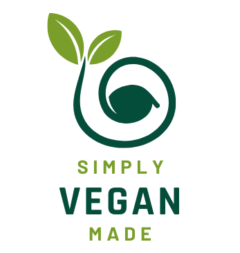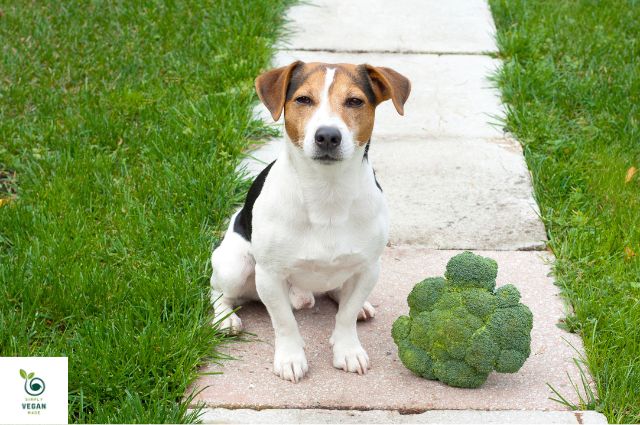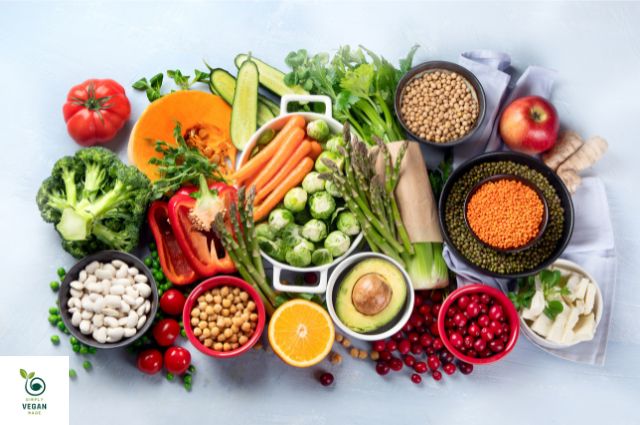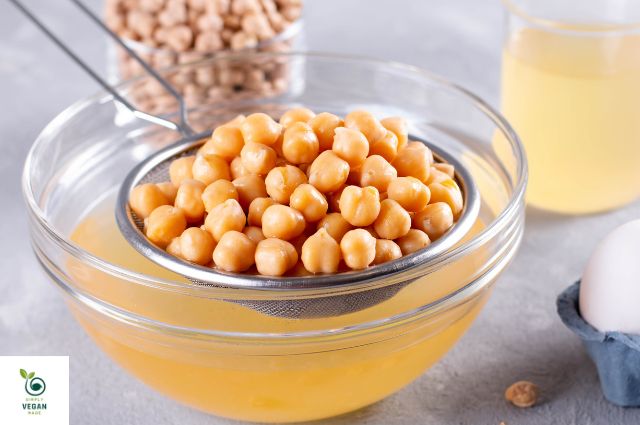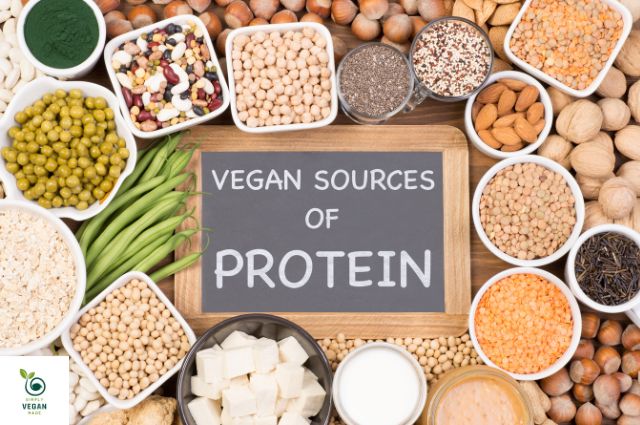As more pet owners become environmentally conscious and seek cruelty-free choices, vegan dog food has gained significant popularity. This comprehensive guide explores the best vegan dog food options, considering factors such as nutritional value, taste, and customer satisfaction.
Read my article for more info about vegan diets for dogs.
Understanding Vegan Dog Food
Vegan dog food is made entirely from plant-based ingredients, excluding any animal products or by-products. This type of diet can be suitable for dogs with certain allergies or dietary restrictions, and it aligns with the ethical beliefs of vegan pet owners.
Ensuring that vegan dog food provides all the necessary nutrients for your dog’s health is crucial. Dogs need specific amino acids, vitamins, and minerals typically found in animal products.
High-quality vegan dog foods are formulated to meet these nutritional needs through plant-based sources and added supplements.
Top Vegan Dog Food Choices on Amazon
1. V-Dog Kind Kibble
V-Dog is a well-established brand in the vegan dog food market. Their Kind Kibble is a popular choice among pet owners seeking a plant-based option.
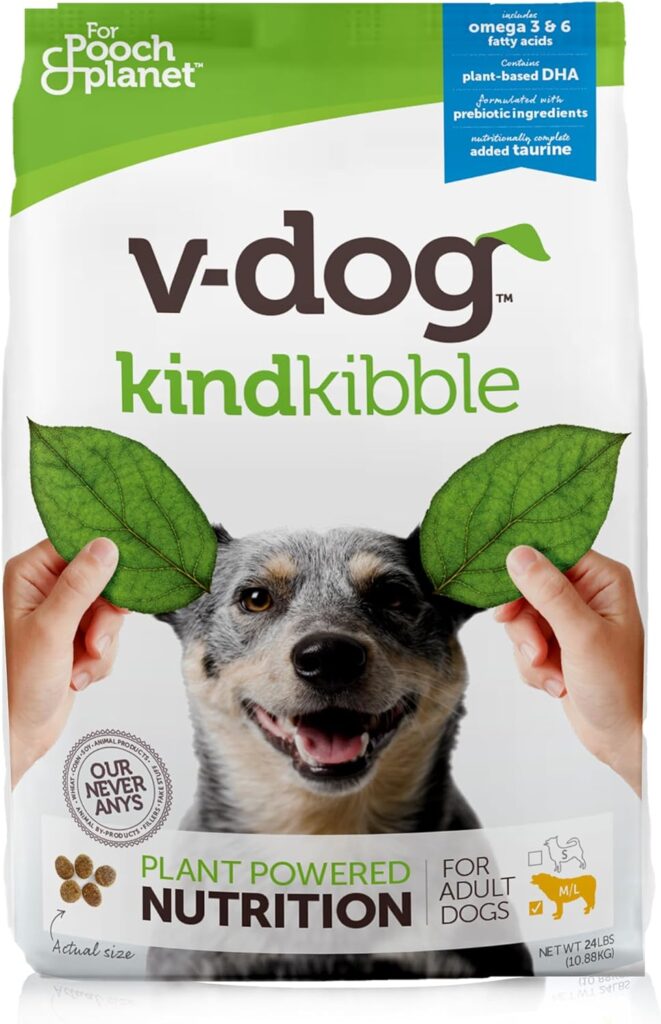
This kibble is made with wholesome ingredients like brown rice, peas, and lentils, providing a good source of protein and fiber.
Key Features:
- 100% vegan ingredients
- No corn, soy, or wheat
- Fortified with essential vitamins and minerals
- Made in the USA
Many customer reviews mention improved coat condition and increased energy levels in their dogs after switching to V-Dog Kind Kibble. The brand’s commitment to using high-quality, plant-based ingredients has earned it a loyal following among vegan pet owners.
V-Dog Kind Kibble also contains added taurine, an essential amino acid for heart health in dogs. This addition addresses one of the main concerns about vegan diets for dogs, as taurine is typically found in animal proteins.
>>> View latest price on Amazon <<<
2. Natural Balance Vegetarian Formula
While not strictly vegan (it contains some vitamin D3 from sheep’s wool), this vegetarian formula from Natural Balance is a close choice and highly rated on Amazon. It’s designed to provide finish and balanced nutrition for adult dogs.
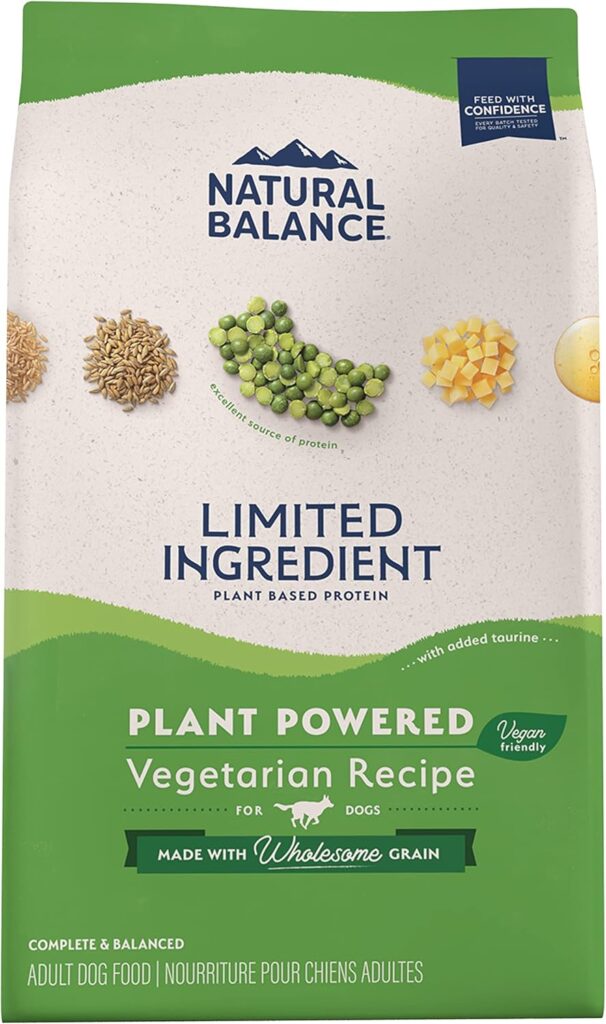
Key Features:
- Brown rice and oatmeal as primary ingredients
- Added taurine for heart health
- Suitable for all breed sizes
- Made without artificial flavors or colors
Many customers appreciate this food for its palatability, even for picky eaters, and report improvements in their dogs’ digestion. The formula includes a blend of peas, potatoes, and barley to provide a balanced amino acid profile, essential for maintaining muscle mass and overall health.
Natural Balance’s reputation for rigorous quality control and safety testing adds an extra layer of confidence for pet owners choosing this brand. Their commitment to transparency includes posting test results for each batch of food on their website.
>>> View latest price on Amazon <<<
3. Halo Holistic
Halo’s Holistic is another top-rated option on Amazon. This recipe uses non-GMO vegetables and nourishing oils to provide a balanced diet for adult dogs.
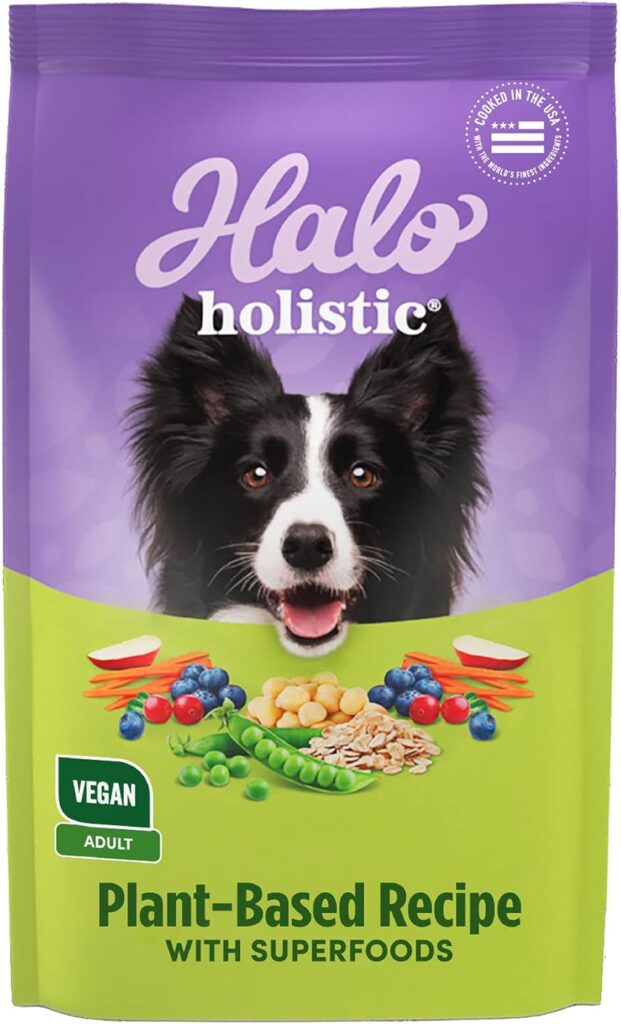
Key Features:
- Whole grains and green peas as protein sources
- Added vitamins and minerals for finish nutrition
- No artificial colors, flavors, or preservatives
- Suitable for dogs with meat protein sensitivities
Reviewers often comment on the high-quality ingredients and how well their dogs adapt to this food. The Vegan Holistic includes a variety of vegetables and superfoods like carrots, blueberries, and apples, providing a diverse nutrient profile and appealing taste for dogs.
Halo’s commitment to sustainability extends beyond their ingredients to their packaging, which is made from recycled materials. This holistic approach to pet nutrition and environmental responsibility resonates with many eco-conscious pet owners.
>>> View latest price on Amazon <<<
4. Wild Earth Clean Protein Dog Food
Wild Earth has gained attention for its innovative approach to pet nutrition. Their Clean Protein Dog Food uses yeast as a primary protein source, offering a unique option in the vegan dog food market.
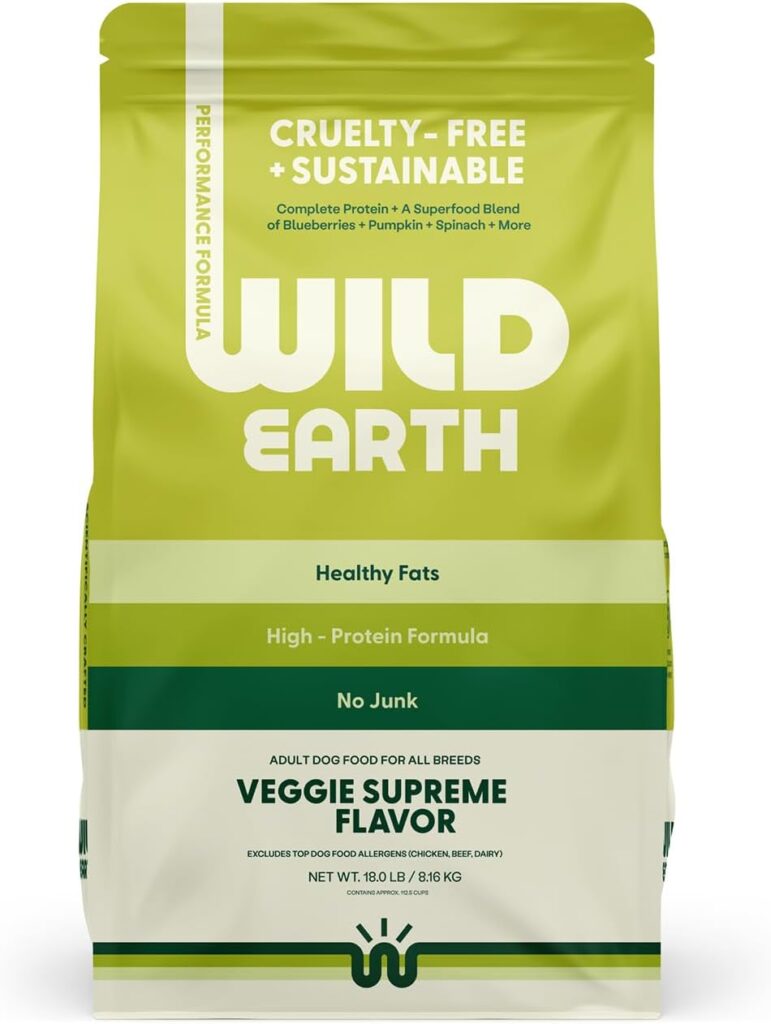
Key Features:
- High protein content from fermented yeast
- Contains all ten essential amino acids
- No animal ingredients, corn, or soy
- Prebiotic fibers for digestive health
Many customers report increased enthusiasm at mealtime and improved stool quality after switching to Wild Earth. The use of yeast as a protein source is particularly interesting, as it provides a finish amino acid profile similar to animal proteins but with a much lower environmental impact.
Wild Earth’s formula also includes superfoods like blueberries, pumpkin, and spinach, enhancing the overall nutritional value of the food. The brand’s focus on sustainability and reducing the carbon “pawprint” of pet food has attracted environmentally conscious pet owners.
>>> View the latest price on Amazon <<<
5. Benevo Organic Vegan Adult Dog Food
For those seeking an organic option, Benevo’s Organic Vegan Adult Dog Food is a strong contender. This UK-based brand is available on Amazon and offers a finish nutritional profile for adult dogs.
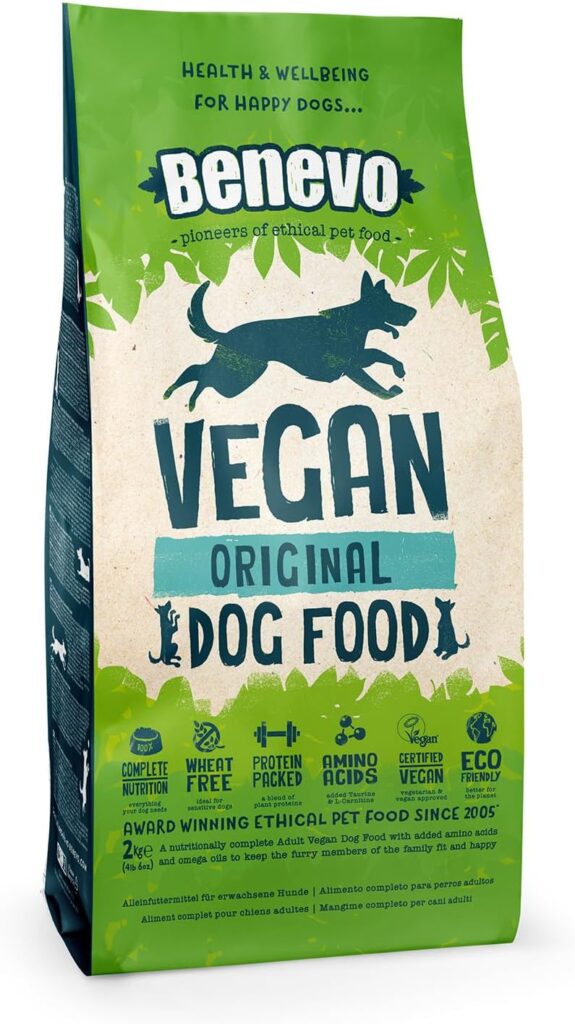
Key Features:
- Certified organic ingredients
- Soy and wheat-free formula
- Added taurine and L-carnitine
- Suitable for dogs with food sensitivities
Customers appreciate the organic certification and often report improvements in their dogs’ coat condition and overall health. Benevo’s commitment to using organic ingredients extends to their protein sources, which include organic soya and organic peas.
The addition of seaweed to their formula provides natural sources of iodine and other minerals, supporting thyroid function and overall health. Benevo’s use of cold-pressed organic sunflower oil helps maintain the integrity of essential fatty acids, crucial for skin and coat health.
>>> View the latest price on Amazon <<<
Considerations When Choosing Vegan Dog Food
When selecting a vegan dog food, several factors need careful consideration:
Nutritional Completeness
Ensuring the food meets AAFCO (Association of American Feed Control Officials) standards for finish and balanced nutrition is crucial. These standards set the least requirements for protein, fat, vitamins, and minerals in pet food.
Look for a statement on the packaging indicating that the food meets or exceeds AAFCO standards for adult maintenance or all life stages.
Protein Content
High-quality plant-based protein sources like peas, lentils, or quinoa should be prominent in the ingredient list. The protein content should be comparable to that of high-quality meat-based dog foods, typically around 18-25% for adult dogs.
Remember that the digestibility of plant proteins can vary, so a slightly higher protein content may be useful.
Essential Nutrients
Check that the food is fortified with crucial nutrients like taurine, L-carnitine, and vitamin B12, which are typically found in animal products. These nutrients play vital roles in heart health, energy metabolism, and nervous system function.
Some vegan dog foods may also include algae-derived DHA, an important omega-3 fatty acid usually found in fish.
Age and Size Appropriateness
Choose a food that’s suitable for your dog’s life stage and breed size. Puppies, adult dogs, and seniors have different nutritional needs, as do small breeds versus large breeds. Some vegan dog food brands offer formulas tailored to these specific needs.
Palatability
Consider your dog’s taste preferences and be prepared to transition slowly to a new food. Some dogs may be hesitant to switch to a plant-based diet initially.
Mixing the new food with their current food and gradually increasing the proportion can help.
Some brands offer sample sizes or money-back guarantees, allowing you to test the food before committing to a large bag.
Allergies and Sensitivities
If your dog has known allergies, carefully check the ingredient list. While vegan diets can be useful for dogs with meat allergies, some dogs may be sensitive to common plant-based ingredients like soy or wheat.
Grain-free options are available for dogs with grain sensitivities.
Transitioning to Vegan Dog Food
Switching your dog to a vegan diet requires a gradual approach. Start by mixing a small amount of the new food with their current food, slowly increasing the proportion over 7-10 days.
This gradual transition helps prevent digestive upset.
Here’s a sample transition schedule:
- Days 1-3: 25% new food, 75% old food
- Days 4-6: 50% new food, 50% old food
- Days 7-9: 75% new food, 25% old food
- Day 10 onwards: 100% new food
Monitor your dog closely during and after the transition. Look for signs of enjoyment of the new food, as well as any changes in energy levels, coat condition, and stool quality.
Some dogs may adapt quickly, while others may need a more extended transition period.
If you notice any concerning changes, such as persistent diarrhea, vomiting, or loss of appetite, slow down the transition or ask your veterinarian. It’s not uncommon for dogs to experience some mild digestive changes when switching to a new diet, but these should decide within a few days.
The Importance of Veterinary Guidance
While many dogs can thrive on a well-balanced vegan diet, it’s not suitable for every dog. Some dogs may have specific health conditions or nutritional needs that need animal-based proteins.
Always talk to your veterinarian before making significant changes to your dog’s diet, especially when considering a vegan option.
Your vet can help you assess whether a vegan diet is suitable for your dog and may recommend regular check-ups and blood work to ensure your dog is getting all necessary nutrients. They can also advise on any supplements that might be useful for your dog’s specific needs.
Regular veterinary check-ups are particularly important when feeding a vegan diet. Your vet can monitor your dog’s overall health, weight, and body condition score, as well as perform blood tests to check for any nutritional deficiencies.
This proactive approach can help catch and address any potential issues early.
Supplementing a Vegan Dog Diet
Even with high-quality vegan dog food, some pet owners choose to add supplements to ensure their dogs receive optimal nutrition. Common supplements for dogs on vegan diets include:
Taurine
This amino acid is crucial for heart health and is typically found in animal proteins. While many vegan dog foods are fortified with synthetic taurine, some owners choose to supplement additionally, especially for breeds prone to heart issues.
L-carnitine
This compound plays a role in fat metabolism and heart health. It’s naturally found in meat but can be synthesized for vegan diets.
Supplementation may be beneficial, particularly for active dogs or those with weight management needs.
Omega-3 Fatty Acids
Typically sourced from fish oil in traditional dog foods, vegan alternatives include algae-derived DHA supplements. These fatty acids support skin health, cognitive function, and can help reduce inflammation.
Vitamin B12
This essential vitamin is naturally found in animal products. While most vegan dog foods are fortified with B12, some owners choose to supplement, especially if their dog shows signs of low energy.
However, many commercial vegan dog foods are already fortified with these nutrients. Always talk to your veterinarian before adding any supplements to your dog’s diet.
Over-supplementation can be as harmful as deficiencies, so professional guidance is crucial.
meals into their diet.
Frequently Asked Questions
Is vegan dog food safe for all dogs?
While many dogs can thrive on a well-balanced vegan diet, it’s not suitable for every dog. Some dogs may have specific health conditions or nutritional needs that need animal-based proteins.
Always ask with a veterinarian before switching your dog to a vegan diet.
Can puppies eat vegan dog food?
Puppies have specific nutritional needs for growth and development. While some vegan dog foods are formulated for all life stages, it’s crucial to ask with a veterinarian before feeding a vegan diet to a puppy to ensure all nutritional requirements are met.
How do vegan dog foods provide protein?
Vegan dog foods typically use plant-based protein sources such as peas, lentils, chickpeas, and soy. Some brands also use innovative protein sources like yeast.
These are combined to provide a finish amino acid profile similar to animal proteins.
Are there any potential health benefits of vegan dog food?
Some dogs with meat allergies or sensitivities may benefit from a vegan diet. Additionally, plant-based diets can be useful for dogs with certain health conditions like liver disease.
However, these benefits depend on the individual dog and the quality of the vegan food.
How long does it take for a dog to adjust to vegan food?
Most dogs adjust to a new diet within 1-2 weeks. However, some may take longer.
It’s important to transition gradually and monitor your dog’s health and behavior during this period.
Can vegan dog food help with allergies?
For dogs allergic to specific animal proteins, a vegan diet can be useful. However, remember that dogs can also be allergic to plant-based ingredients, so careful selection is necessary.
Does vegan dog food contain all necessary nutrients?
High-quality vegan dog foods are formulated to provide all necessary nutrients, including proteins, fats, vitamins, and minerals. However, the bioavailability of some nutrients may differ from meat-based foods, so regular veterinary check-ups are important.
How does the cost of vegan dog food compare to traditional dog food?
Vegan dog foods are often more expensive than traditional dog foods because of the cost of ingredients and production. However, prices vary among brands and may become more competitive as demand increases.
Can dogs get enough taurine from vegan food?
While taurine is naturally found in animal products, many vegan dog foods are fortified with synthetic taurine. Some dogs may need extra supplementation, which should be discussed with a veterinarian.
How does vegan dog food impact dental health?
The impact of vegan dog food on dental health can vary. Some vegan kibbles are designed to help clean teeth, while others may be softer.
Regular dental care, including brushing and dental chews, stays important regardless of diet.
Key Takeaways
- Vegan dog food can be a suitable option for many dogs, but it’s crucial to choose high-quality, nutritionally finish brands.
- Consult with a veterinarian before switching to a vegan diet, especially for puppies, seniors, or dogs with health issues.
- Gradual transition and close monitoring are essential when introducing a new diet.
- Regular check-ups and possibly blood work can help ensure your dog is thriving on a vegan diet.
- While vegan diets can have environmental and ethical benefits, the dog’s health should always be the primary consideration.
